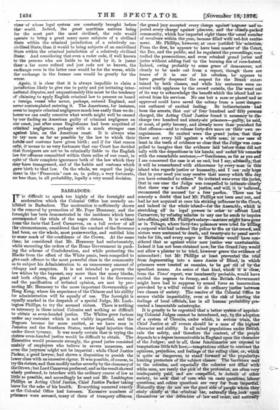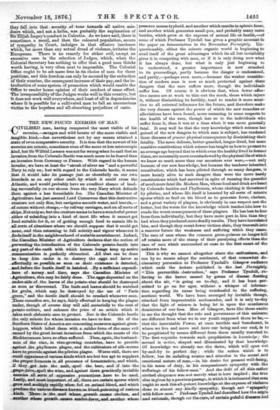BARBADOEff: TV`is . difficult to speak too highly of the foresight
and moderation which the Colonial Office has recently ex- hibited- in Barbadoes. The moderation is sufficiently shown- iii the removal by promotion of Mr. Pope Hennessy, and' the foresight has been demonstrated in the incidents which have aroompatied the' trials of the negro rioters. It is evid'ent trim.. the facts that Lord Carnarvon, on a full review' of all the circumstances, considered that the conduct of the Governor had been, on- ths whole, most praiseworthy, and entitled him to-some mark of the-confidence of the Crown. At the same time;' he considered that Mr. Hennessy had unfortunately, while-executing the orders of the Home Government in push- ing the. scheme of Confederation and while protecting the Blacks from the effect of the White panic, been compelled to give-sueh offence to the most powerful class in the community as to subject his Administration to an unnecessary amount of obloquy and suspicion. It is not intended to govern the few whites by the bayonet, any more than the' many blacks, and both objects, the grant of a reward to the Governor and the pacification of irritated opinion, are met by pro- moting Mr. Hennessy to the more important Governorship of Hong Kong, where his experience of the Chinese and his ability for administration will' be equally of use. The foresight is equally marked in the despatch of a special Judge, Mr. Lush- ingWw Phillips, to try the accused rioters. There is nothing so necessary in these-mixed Colonies and nothing so difficult to- ohtain as even-handed justice. The Whites grow furious under' any restraint which is not visibly impartial, and the Negroes become far more excited, as we have seen in Jamaica and the Southern States under legal injustice than under direct tyranny. It was nearly certain that in trying the rioters even-handed justice would be difficult to obtain. The Executive would prosecute' strongly, the grand juries consisted mainly of employers who believe in severe measures and even the jurymen might not be impartial ; while Chief justice Packer, a good lawyer, had shown a disposition to punish the lowerclass. with an excessive rigour. It was possible of course, to try the rioters, and then modify undue severity by the clemency of the Orown ; but Lord Canarvon preferred, and as the result showed wisely preferred, to interfere with the ordinary course of law as little as possible, and accordingly he sent out Mr. Lnshington Phillips as Acting Chief Justice, Chief Justice Packertaking leave- for the sake of his health. Everything occurred exactly as the Colonial Office had foreseen. Excessive numbers of prisoners were accused, many of them. of trumpery offences, the grand jury accepted every charge 'against negroes and re- jected every chargs against' planters, and the closely-packed community, which has imported eight times -the usual number of revolvers within the year, became-filled.with red-hot excite- ment. Mr. Phillips, however, at once justified his selection. From the first, he appears-to have been master-of' the Court; the Bar, and the public, and he regulated the proceedings, con- trolled the prosecutions, and- even rebuked grand juries au& juries without adding fuel to the burning fire of race-hatred; Indeed, owing probably to some grace of demeanour, not clearly to be made. out from a report, though" there are traces of it in one of his rebukes, he appears to have greetly deepened the respect for the Bench. enter- tained by both classes, and while his sentences were re- ceived with applause by the crowd outside' the Bar went out' of its way to acknowledge' the benefifrwhich the island- had dived from his services. No one but a man se-placed and so. approved could have saved the 'colony- from a most danger- ous outburst of excited feeling-. So indiscriminate had been the arrests, that out of four hundred and 'fifty perm= charged, the Acting Chief Justice found- it necessary-to diss. charge two hundred and ninety-six prisoners—guilty, he said, at most, of petty larceny, and already more than punishedfon that offence—and' to' release forty-five more on-their own rev cognisances. So excited were, the grand juries; that they- threw out every bill against a white man, in- one case at' least in the teeth of evidence- so' clear that the Judge was com- pelled to imagine that the evidence laid before them' did not tally with the depositions in. his hands; and ended his remarks with the remarkable sentence;—' Gentlemen, as far as you and I are concerned the case is at an. end, but I say, advisedly, that it will be remembered' with abhorrence by every-man in this island who regards justice' or humanity, and I can only' hope that in your need-you-may-receive that mercy which this day- you have extended to-others." So irritated were-even' the juriesr, that in one case the Judge was compelled to intimate ckarly that there- was- a failure of justice; and will, it is believed, recommend the accused for a free pardon. There can bs scarcely a doubt that htunfr. Phillips not been sent out, and had he not acquired' at ones his striking influence-in-the Court, and indeed in the- whole island—for-the Assembly, which is stretching all' its legal' powers- in order- to- affront Lord Carnarvon, by-refusing salaries to any one-he sends to-inquire into affairs;paid Mr. Phillips's salary—matters' nright have gone as. in Tbbago, where forty-two prisoners were- tried for killing a corporal who had ordered the police to- thy on-the-crowd, an& sixteen were sentenced to- death, and twenty-six to penal servi- tude for life;- and every negro in Barhatlber would have con- sidered that as against white- men justice was unattainable. Indeed it has not been obtained now, for the Grand Jury would not allow a planter to be tried, however grave the evidence of misconduct; but Phillips at least prevented the trial from degenerating into a mere Assize of Blood, in which prisoners were- treated as enemies to be got- rid of by the speediest means. An assize of that kind, which- it' is clear, from the Times' report; was imminently probable, would have excited the negroes to- frenzy, and the British- Government might have had to suppress by armed force an insurrection- provoked by a wilful refusal to do ordinary justice between two classes of society; The resolve of the Colonial Office to secure visible impartiality, even. at the risk of hurting the feelings of local officials, has in all human probability pre- vented a lamentable catastrophe.
It is greatly to be regretted that a better system of appoint- ing Colonial Judges cannot be introduced, say, by the adoption of a system of Circuits, under which, in serious trials, the Chief Justice at all events should be a man of the highest character and ability-. In all mixed populations under British rule the safety, and therefore the content, of the people depends to a degree inconceivable in England upon the character of the Judges; and in all, those functionaries are exposed to temptations little felt here,—temptations either to contract the opinions, prejudices, and feelings of the ruling' class, or, which is quite as dangerous, to stand forward as- the popularity. hunting protectors of the subject classes. The barristers sent to the colonies, and especially the colonies not filled with white men, are rarely the pick of the profession, are often very inadequately paid; and are compelled, in default of other society, to- seek that of men who on caste questions, labour questions, and colour questions are very far from impartial. Naturally they do not see the good side of people whom they study chiefly at the- criminal bar, naturally they look upon themselves as the defenders of law and order, and naturally
they fall into that severity of tone towards all native mis- doers which, and not a bribe, was probably the explanation of Sir Elijah Impey's conduct in Calcutta. As we have said, there is sometimes a recoil, and then the coloured population, secure of sympathy in Court, indulges in that effusive insolence which, far more than any actual dread of violence, irritates the Europeans. There is no remedy for either evil, except an excessive care in the selection of Judges, which, when the Colonial Secretary has nothing to offer that a good man thinks worth having, is very often next to impossible. The Colonial Office ought to be set more free in its choice of men for these positions, and this freedom can only be secured by the reduction of their number, the consequent increase of their pay, and the in- troduction of some system of promotion which would enable the Office to render home opinion of their conduct of some effect. The irresponsibility of the Judges works well in this country, but it does not work well everywhere, and least of all in dependencies where it is possible for a cultivated man to fall an unconscious victim to the hopeless and all-absorbing prejudices of caste.







































 Previous page
Previous page